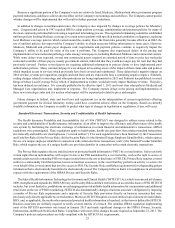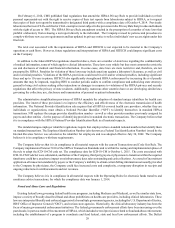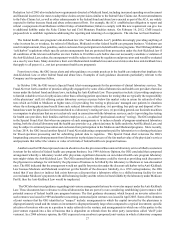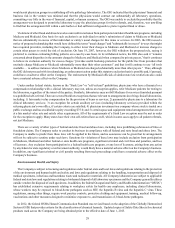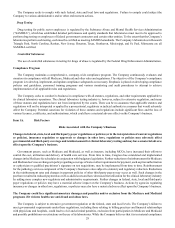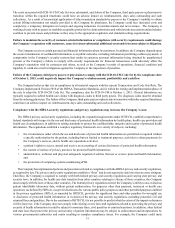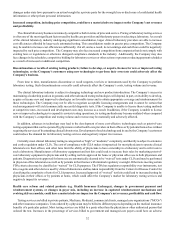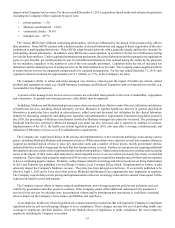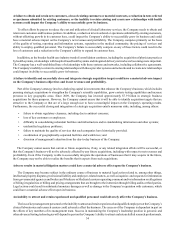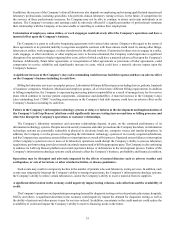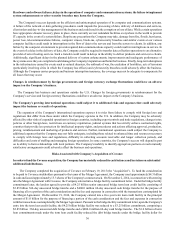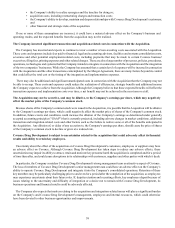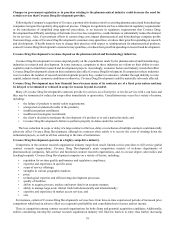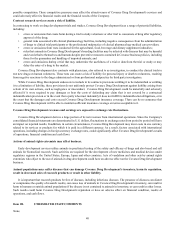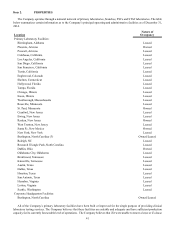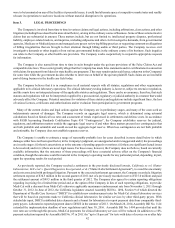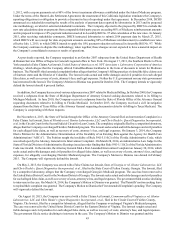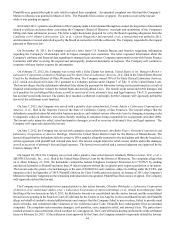LabCorp 2014 Annual Report Download - page 37
Download and view the complete annual report
Please find page 37 of the 2014 LabCorp annual report below. You can navigate through the pages in the report by either clicking on the pages listed below, or by using the keyword search tool below to find specific information within the annual report.35
In addition, the success of the Company’s clinical laboratories also depends on employing and retaining qualified and experienced
laboratory professionals, including specialists, who perform clinical laboratory testing services. In the future, if competition for
the services of these professionals increases, the Company may not be able to continue to attract and retain individuals in its
markets. The Company’s revenues and earnings could be adversely affected if a significant number of professionals terminate
their relationship with the Company or become unable or unwilling to continue their employment.
Unionization of employees, union strikes, or work stoppages could adversely affect the Company's operations and have a
material effect upon the Company's business.
The Company is a party to collective bargaining agreements with various labor unions. Disputes with regard to the terms of
these agreements or its potential inability to negotiate acceptable contracts with these unions could result in, among other things,
labor unrest, strikes, work stoppages, or other slowdowns by the affected workers. If unionized workers were to engage in a strike,
work stoppage, or other slowdown, or other employees were to become unionized, the Company could experience a significant
disruption of its operations or higher ongoing labor costs, either of which could have a material adverse effect upon the Company's
business. Additionally, future labor agreements, or renegotiation of labor agreements or provisions of labor agreements, could
compromise its service reliability and significantly increase its costs, which could have a material adverse impact upon the
Company's business.
A significant increase in the Company’s days sales outstanding could increase bad debt expense and have an adverse effect
on the Company’s business including its cash flow.
Billing for laboratory services is a complex process. Laboratories bill many different payers including doctors, patients, hundreds
of insurance companies, Medicare, Medicaid and employer groups, all of which have different billing requirements. In addition
to billing complexities, the Company is experiencing increasing patient responsibility as a result of managed care fee-for-service
plans which continue to increase patient copayments, coinsurance and deductibles. A material increase in the Company’s days
sales outstanding level (“DSO”) resulting in an increase in the Company’s bad debt expense could have an adverse effect on the
Company’s business including its cash flow.
Failure in the Company’s information technology systems or delays or failures in the development and implementation of
the Company's LabCorp Beacon® platform could significantly increase testing turn-around time or billing processes and
otherwise disrupt the Company’s operations or customer relationships.
The Company’s laboratory operations and customer relationships depend, in part, on the continued performance of its
information technology systems. Despite network security measures and other precautions the Company has taken, its information
technology systems are potentially vulnerable to physical or electronic break-ins, computer viruses and similar disruptions. In
addition, the Company is in the process of integrating the information technology systems of its recently acquired subsidiaries,
and the Company may experience system failures or interruptions as a result of this process. Sustained system failures or interruption
of the Company’s systems in one or more of its laboratory operations could disrupt the Company’s ability to process laboratory
requisitions, perform testing, provide test results in a timely manner and/or bill the appropriate party. The Company is also continuing
to enhance its LabCorp Beacon platform and could experience delays or deficiencies in the development process. Failure of the
Company’s information technology systems could adversely affect the Company’s business, profitability and financial condition.
Operations may be disrupted and adversely impacted by the effects of natural disasters such as adverse weather and
earthquakes, or acts of terrorism, or other criminal activities, or disease pandemics.
Such events may result in a temporary decline in the number of patients who seek laboratory testing services. In addition, such
events may temporarily interrupt the Company’s ability to transport specimens, the Company’s information technology systems,
the Company’s ability to utilize certain laboratories, and/or the Company’s ability to receive material from its suppliers.
A significant deterioration in the economy could negatively impact testing volumes, cash collections and the availability of
credit.
The Company’s operations are dependent upon ongoing demand for diagnostic testing services by patients, physicians, hospitals,
MCOs, and others. A significant downturn in the economy could negatively impact the demand for diagnostic testing as well as
the ability of patients and other payers to pay for services ordered. In addition, uncertainty in the credit markets could reduce the
availability of credit and impact the Company’s ability to meet its financing needs in the future.


